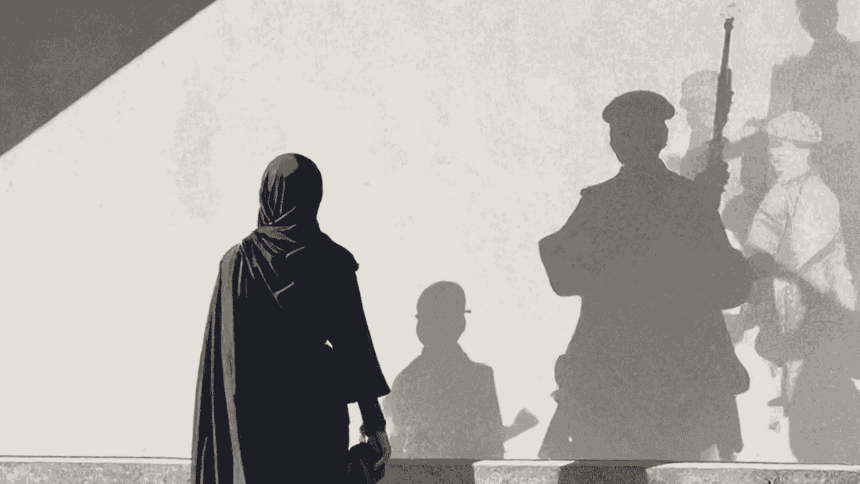An Indian Convert to Islam: The Threat of Anti-Conversion Laws to Identity
Religious conversion is often misunderstood as a mere change of religion; however, for many, it represents a profound, born-again experience. This journey may reflect a return to an innate understanding of the oneness of God. It involves a spiritual rebirth that reshapes a person’s intellect and existence.
In her personal account, Srishti Lakhara, who embraced Islam four years ago, illustrates the complexities surrounding this choice. Initially, she believed she had chosen a faith that provided her with meaning and peace, but soon realized that she was now regarded as a suspect in her own country. The Rajasthan Prohibition of Unlawful Conversion of Religion Bill, recently enacted, introduces severe penalties for unauthorized conversions, which Lakhara describes as a form of dehumanization for those who choose to believe differently.
As a Muslim convert in India, Lakhara notes that South Asian converts often remain invisible in broader Muslim discussions, especially within India, where they face criminalization and social stigma. The scrutiny surrounding conversions often devolves into conspiracy theories, reducing these personal decisions to allegations of deceit, which can lead to hostility against converts.
The Rajasthan Anti-Conversion Bill, among others in states like Uttar Pradesh and Gujarat, imposes severe sanctions—potential life sentences and fines reaching ₹1 crore for those accused of facilitating conversions. It requires individuals seeking to change faiths to submit a declaration 90 days before the conversion, facing scrutiny from officials about their intentions. This bureaucratic process transforms a deeply personal act into an invasive public ordeal.
The law not only complicates voluntary conversions but also vilifies interfaith relationships, invoking the controversial concept of “love jihad.” This climate of suspicion isolates converts and creates barriers to open dialogue and coexistence.
In India, the act of converting to Islam is often politicized, where converts are perceived as betraying their heritage or falling victim to foreign influences. Lakhara herself has been subject to various accusations, reflecting a perception that undermines personal choice, reducing her journey of faith to mere bureaucratic formalities.
The Anti-Conversion Bill further complicates this landscape by mandating that individuals justify their faith decisions, particularly amid an atmosphere where proponents of “Ghar Wapsi”—the return to Hinduism—are celebrated without scrutiny. The law exhibits clear bias, treating conversions from Hinduism as legitimate while criminalizing those toward Islam or Christianity.
The narrative of “forced conversion,” often weaponized for political aims, casts a shadow over genuine voluntary conversions. Individuals assisting those seeking to convert, along with the converts themselves, risk criminal charges merely for practicing their beliefs. High-profile cases of individuals accused of facilitating forced conversions further complicate the already fraught situation, often leading to stigmatization and legal repercussions for acting on one’s faith.
Gender dynamics exacerbate these challenges, especially for women. Female converts face multiple layers of scrutiny, where their decisions are perceived through the lens of victimhood rather than personal agency. Historical cases, such as that of Hadiya, a woman whose conversion was contested in court, highlight the societal doubt cast upon Muslim women without regard for their autonomy.
The Rajasthan Anti-Conversion Bill, while ostensibly aimed at protecting religious freedom, encroaches upon personal beliefs, undermining individual rights enshrined in Articles 25 and 26 of the Indian Constitution. The legislation creates an environment of fear and suspicion around private faith practices, effectively criminalizing the exercise of personal belief.
Lakhara articulates a plea for a reformation of the discourse surrounding religious conversion in India. Protecting the freedoms of converts ensures that their choices are respected, preserving their dignity and rights as individuals. Without recognition and support, the experience of being a convert can feel like an act of rebellion against state-sanctioned narratives.
Ultimately, these developments challenge the essence of personal freedom, transforming what should be a journey of faith into a potential crime. The harsh reality for converts in India is that while they may find rebirth in their beliefs, they also face daily struggles for acceptance and identity within a complex sociopolitical landscape.
Srishti Lakhara is a postgraduate in Clinical Psychology, focusing her work on resilience, grief, and healing while exploring faith, psychology, and philosophy in her writings.
Tags: anti-conversion law, Indian convert, Islam identity, religious freedom, cultural identity
Hashtags: #Indian #convert #Islam #anticonversion #law #threatens #identity










